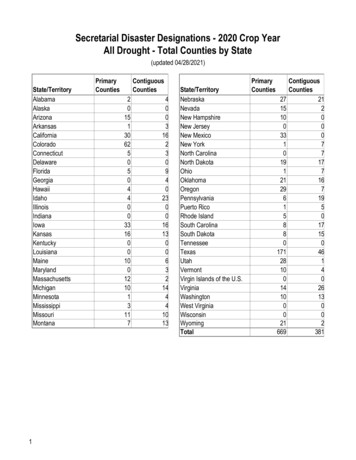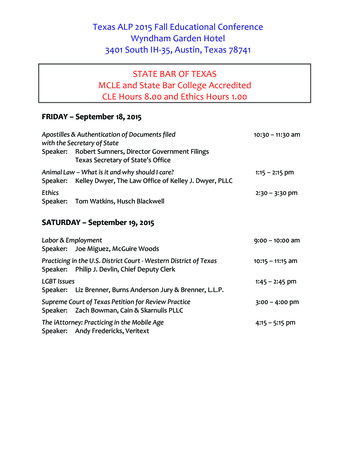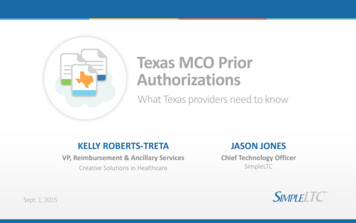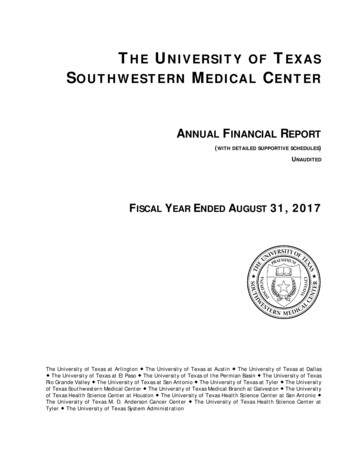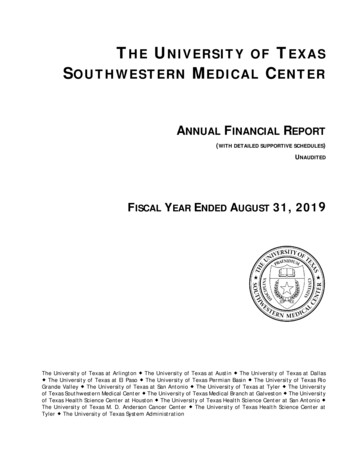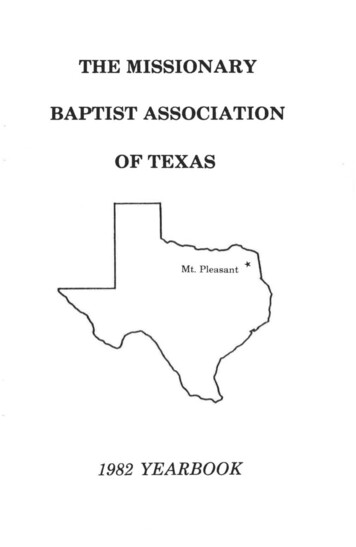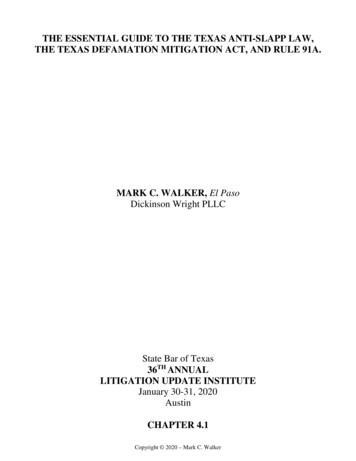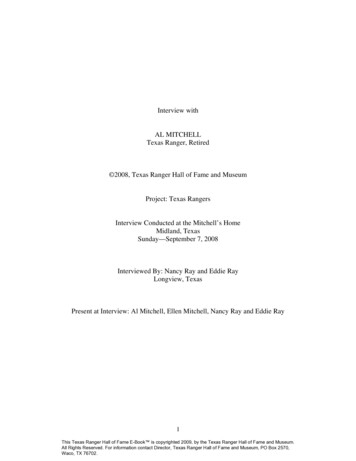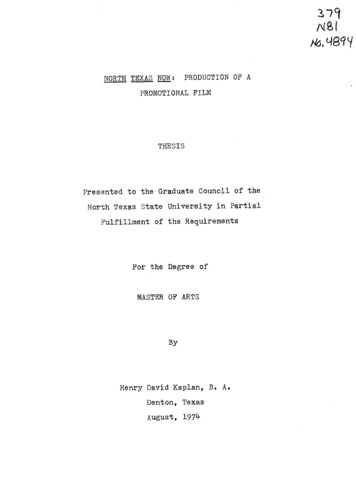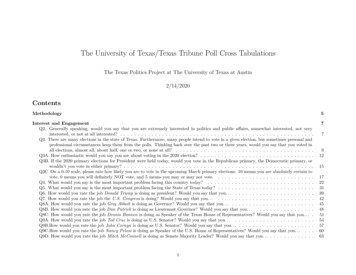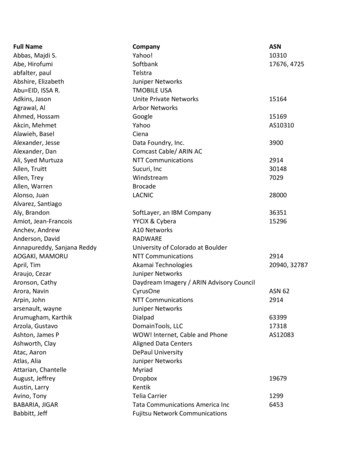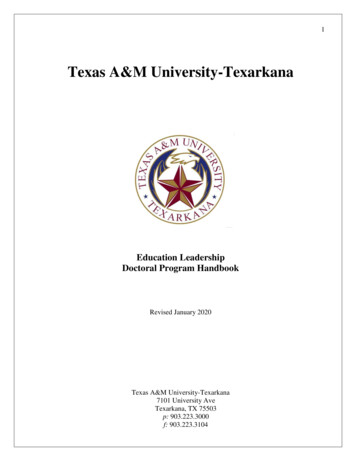
Transcription
1Texas A&M University-TexarkanaEducation LeadershipDoctoral Program HandbookRevised January 2020Texas A&M University-Texarkana7101 University AveTexarkana, TX 75503p: 903.223.3000f: 903.223.3104
2Welcome!Thank you for your interest in the Scholars of Practice doctoral program in Education Leadership atTexas A&M University-Texarkana, a degree designed with a public school and higher educationemphasis to meet the demands of education today. Graduates of the doctoral program often pursueleadership positions in public school districts, higher education, state or federal agencies, or theprivate sector. The Scholars of Practice degree is a web-enhanced doctoral program in which coursesare approximately 50% online and 50% face-to-face delivered in a seminar format, providingflexibility for working students as well as the personal interaction for which A&M-Texarkana isknown.Applicants for the A&M-Texarkana’s Scholars of Practice doctoral program may have completed amaster's degree in Education Leadership or other related degree. However, we encourage those withmaster’s degrees from other disciplines that support public school or higher education settings toconsider applying. Prerequisites for success include a demonstration of strong academic attainment(including outstanding writing skills), potential scholarship ability, leadership abilities, andcommitment to education.If you have any questions about this program, you can contact the Office of Graduate Studies andResearch at 903-223-3129 or you can contact the Doctoral Program Coordinator, Dr. Sara Lawrence,at sara.lawrence@tamut.edu.Once again, thank you for your interest in the Scholars of Practice doctoral program at Texas A&MUniversity-Texarkana.Note: This handbook is subject to change. Updates will be available on the Education Leadership Department website.This is not a catalog and does not have catalog privileges.
3TABLE OF CONTENTSOUR MISSION . 5COLLEGE OF ARTS, SCIENCE, AND EDUCATION (CASE) . 5GENERAL INFORMATION . 6PROGRAM REQUIREMENTS . 6PROGRAM COMPONENTS . 6COURSE WORK: . 6Course Components . 6Course Related Travel . 7COMPREHENSIVE EXAMINATION . 7DISSERTATION . 8DEPARTMENT OF EDUCATION LEADERSHIP FACULTY . 8DOCTORAL STUDENT CONTACT INFORMATION . 9PROGRAM ADMISSION . 10DEGREE PLAN . 11GENERAL GUIDELINES . 11TIME LIMITATION FOR DEGREE . 11TRANSFER CREDIT . 11COMPETENCY-BASED CREDITS . 11RESEARCH TOOLS . 11COURSE SEQUENCE . 12COMPREHENSIVE EXAMINATION . 13PREREQUISITES . 13REGISTRATION FOR THE DOCTORAL COMPREHENSIVE EXAMINATION . 13SCHEDULE OF EXAMINATIONS AND CONTENT AREAS TESTED . 13EVALUATION OF EXAMINATION . 13ORAL COMPREHENSION EXAM . 14FINAL REPORT OF DOCTORAL COMPREHENSIVE EXAMINATION . 14RECOMMENDED TIME FRAME . 15TIMETABLE . 15MINIMAL PROGRESS . 16STUDENT RESOURCES . 17MAJOR ADVISOR'S ROLE . 17DISSERTATION COMMITTEE CHAIR . 17DISSERTATION COMMITTEE . 17OFFICE OF GRADUATE STUDIES AND RESEARCH. 17GRADUATION . 18
4FILING FOR GRADUATION . 18COMMENCEMENT . 18ADDITIONAL INFORMATION . 18PROGRAM CHECKLIST . 19CONGRATULATIONS! . 20
5OUR MISSIONThe mission for Education Leadership at A&M-Texarkana is to be an advocate for all master anddoctoral candidates both inside and outside the classroom. We propose to do this by effectivelypreparing candidates for leadership roles in fields of education.College of Arts, Science, and Education (CASE)The online Education Leadership Master’s Degree and Principal Certification Program is led byexperienced faculty dedicated to the mission and vision of the Texas A&M UniversityTexarkana and the College of Arts, Science, and Education.College of Arts, Science and Education MissionWe are a community of scholars who challenge each other to lives of inquiry.Education Department MissionTeach others to teach well.Education Department VisionTeach well.Education Department Beliefs and Core ValuesGood teaching is complex.Good teaching is deeply reflective.Good teaching can be replicated.Good teachers continuously improve.
6TEXAS A&M UNIVERSITY-TEXARKANACOLLEGE OF ARTS, SCIENCES, AND EDUCATIONOFFICE OF GRADUATE STUDIESDoctor of Education (Ed.D.) in Education LeadershipScholars of Practice Doctoral ProgramGENERAL INFORMATIONStudents admitted into the Scholars of Practice doctoral program are held to the academicpolicies and procedures contained in the university catalog, doctoral handbook and dissertationmanual for their year of admission (cohort). Updates, corrections, or clarification may be madeafter publication of these documents and will be communicated to students via ACE email.Students are responsible for reading ACE email regularly.Students admitted to the doctoral program will begin classes as a cohort group and are requiredto progress as a cohort group through a sequence of doctoral-only core courses and researchtools courses. The cohort program provides students with an opportunity to progress throughthe program in a logical and sequential manner with a group of colleagues pursuing similarprofessional goals. The degree plan is 60 semester credit hours.PROGRAM REQUIREMENTSRequirements for program completion include the following:1. Completion of 60 hours of course work with minimum 3.0 GPA and no grade below a“C”2. Successful completion of Comprehensive Exams3. Successful Completion of DissertationPROGRAM COMPONENTSCourse Work:The doctoral program is a 60 semester credit hours (SCH) Scholars of Practice program withfour areas for completion. Students complete coursework in a cohort experience enrolling in 6SCH (2 courses) each semester. Courses are delivered via a Web-Enhanced/Hybrid format.Approximately 50% is online and 50% face-to-face. Face-to-face class meetings (seminars) areheld three weekends in the fall and spring semesters and up to two weekends in the summersemester.Course Components1. Education Leadership (Core) Content - 8 courses/ 24 SCH. Core courses delivered aspart of the cohort model. Students must take all core courses within this model unlessthey apply for a leave of absence from the program. Core courses are not eligible fortransfer or competency credit. Core courses prepare students to complete comprehensive
7exams successfully. Topics include strategic management & change; education marketing& public relations; critical conversations & team building; applied instructionalstrategies; and contemporary issues in educational leadership.2. Cognate Courses - 4 courses/12 SCH. A cognate is a block of courses connecting toEducation Leadership and doctoral student’s professional goals that may be completedprior to admission or after cohort courses are complete. Candidate must complete cognatecourses prior to enrolling in dissertation courses (EDLD 693 – 3 SCH). Competencybased and/or transfer credit available. Eligible candidates may earn superintendentcertification at A&M-Texarkana as a cognate area. Cognate courses must be approved byprogram coordinator.3. Research Tools - 4 courses/12 SCH. Research tools courses prepare candidates forcompleting a dissertation.4. Dissertation hours – 4 courses/12 SCH required minimum. Doctoral candidates completea dissertation upon successful completion of course work (maintain 3.0 GPA with nograde below a "C") and the written comprehensive examination.Course Related TravelA&M-Texarkana is committed to experiential learning including study abroad opportunities thatbroaden student perspectives necessary to lead in a global and well-connected world. Educationleadership faculty are committed to providing these opportunities in a manner that best meets themissions of the Scholars of Practice Program, College of Arts, Sciences, and Education andA&M-Texarkana. The program works to provide the best travel experience at a cost that isreasonable. Students should expect to commit funding for these opportunities, up to 2,500. TheUniversity commits to working with students to determine eligibility for financial aid or paymentplans to fund travel experience.Comprehensive ExaminationThe Doctor of Education Leadership Comprehensive Examination is a milestone event in theacademic program of study leading to candidacy. Specifically, the comprehensive examinationprovides the doctoral student an opportunity to 1) demonstrate comprehensive understanding ofthe knowledge base, 2) provide an opportunity to chronicle the student’s foundations as anacademic as well as an educational leader, 3) demonstrate and characterize a grounded vision ofleadership in the Education Leadership context for the future, and 4) provide academic insightsand thought that reflect the work completed with their major advisor through the residency andother professional activities during doctoral study. Each student will first take a writtenComprehensive Examination scheduled and administered simultaneously to a cohort of students.The comprehensive examination is not intended to be an exercise in regurgitating all that astudent has gained and learned throughout the program. Rather, this exam grounds the studentin the academic discipline, so the student may construct new knowledge that will demonstratethoughtful yet inquisitive thinking and scholarship.
8DissertationAfter doctoral candidates are admitted to candidacy, they are required to enroll in threesemester hours of dissertation writing each fall and spring semester until the dissertation iscompleted and recommended by the dissertation committee for approval from the Dean ofCollege of Arts, Sciences, and Education and Dean of Graduate Studies. Students who fail toenroll for dissertation during any fall or spring semester after admission to candidacy will beprohibited from enrolling until the tuition has been collected for each semester.NOTE: Doctoral candidates will not be required to enroll during the summer term, unlessrecommended by the dissertation chair. A candidate cannot defend dissertation during thesummer. Also note: students may be required to pay out-of-state tuition after they havecompleted 130 hours of work.Students should refer to the Dissertation Manual for further information regarding dissertationprocesses.Department of Education Leadership FacultyThe faculty of the Education Leadership Master’s Degree and Principal Certification Programare professional educators who bring their Texas public school leadership experiences to theprogram. Our faculty have served as assistant principals, principals, coordinators, directors,assistant superintendents, and superintendents in various school districts. Their field-basedunderstandings combined with active research agendas make for the best possible learningopportunities as students seek to become educational leaders who will make a difference inschools, school districts, and local communities.Sara Lawrence, Ph.D.Associate Dean of CASESara.Lawrence@tamut.eduKathy Lease, Ed.D.Ad Interim Associate Professor of Education LeadershipKlease@tamut.eduTrisha Gerrish Ray, Ed.D.Ad Interim Professor of Professional Practice in Education LeadershipTrisha.Ray@tamut.edu903-334-6680Rebeca Cooper, Ed.D.Assistant Professor of Education LeadershipRebeca.Cooper@tamut.edu
9Doctoral Student Contact InformationQuestions beyond the scope of this handbook should be directed to the following departmentsand/or individuals.Jana Boatright, Registrarregistrar@tamut.eduCourse enrollment issuesStacey Epps, Coordinator of Financial AidStacey.Epps@tamut.eduKatheryn HartshornKatheryn.Hartshorn@tamut.eduCertification CoordinatorDr. Sara Lawrence, Associate Dean of CASE, Associate Professor of Educational Psychology:Doctoral Program Coordinator & Student AdvisorSara.Lawrence@tamut.edu
10PROGRAM ADMISSIONAdmission to the doctoral program in Education Leadership is a competitive process. Witheach cohort, the department receives more applications from qualified students than can beaccepted. Consequently, application materials should be carefully prepared to present thestudent in the most positive light.A new doctoral cohort begins course work in the spring semester of even years. Doctoralstudents must apply to and be accepted by the A&M-Texarkana Scholars of Practice doctoralprogram.Applications for a new cohort open in January of odd years. Application materials are acceptedbetween January – August of odd years: application materials are due to the Office of GraduateStudies by August 31st. A list of current admission requirements and packet materials arelocated on the doctoral program website. Please be advised, completion of application packetcan take time. Applicants are encouraged to begin the application process early.Packet Review: The Office of Graduate Studies forwards completed application packets to theProgram Admissions Committee Chair for review in September by the Program AdmissionsCommittee. The Program Admissions Committee is composed of faculty members teachingcourses in Education Leadership. The committee reviews packets using a committee-approvedrubric focusing on quality of packet material presenting evidence that an applicant will besuccessful in the program. If the sum of rubric points falls within the accepted entrancerequirement range, then the committee will invite the student for an online interview.Interviews: End of September/beginning of October, Office of Graduate Studies contactsapplicants via email to participate in an online interview using an online platform. Theinterview is 15-20 minutes in length. The committee members score applicant interview usinga committee-approved rubric.Admission: At the conclusion of the process, the committee will recommend a cohort ofstudents for approval by the Office of Graduate Studies. The committee will also produce a listof “alternate” applicants depending on the number of qualified applicants.Notification: The Office of Graduate Studies will notify applicants in writing of theiradmission status the first week of November. Admission status will include the following:accepted, placed on list of alternates, or denied.Orientation: Notifications of acceptance will invite those admitted to an orientation held on aSaturday in November. It is highly encouraged all admitted attend the orientation.
11DEGREE PLANGeneral GuidelinesAll doctoral degree plans must include the coursework equivalent of a master's degreeprogram. This requirement, in addition to the 60 semester credit hours (SCH) of doctoralcoursework, equals a minimum 90 semester credit hours of post-baccalaureate coursework.Time Limitation for DegreeAll degree requirements beyond the master's must be completed within ten calendar yearsfrom the date of admission to the doctoral program. No coursework beyond the master'sdegree that is over ten years old at the time the doctoral degree is conferred can be usedtoward the doctoral degree.Transfer CreditWith advisor recommendation and program coordinator approval, a student may transfer amaximum of 12 SCH from another regionally accredited institution of higher education towardthe doctoral degree. However, only courses for which the student received a grade of "B" orbetter may be transferred, and all courses transferred must have been completed within 10years of completion of the doctoral degree. Substitutes for core courses may not be transferredinto the degree plan. All transferred courses within the 12 SCH cognate must fit within thestudent’s cognate choice. Approved courses will be posted on the degree plan. Under nocircumstances may a student transfer more than 12 hours toward the doctoral degree.Competency-Based CreditsStudents may apply for competency-based credits based on work experience, outside trainings,and other approved life experiences. Credit is granted based on documentation (e.g. portfoliocompleted by the student) and reviewed by the Office of Graduate Studies and Research,program coordinator, and the student's advisor.Research ToolsAll research tool courses must be taken in sequence and completed prior to enrolling indissertation study (EDLD 693).
12COURSE SEQUENCEThe required courses for completion are provided below. Students are expected to takecourses (with the exception of the 12 SCH cognate and dissertation work) with theirassigned cohort.Information contained in this document is subject to additional provisions found in the A&M Texarkana University Catalog.CourseTitleHoursEDLD 611EDLD 612EDLD 622EDLD 623Doctoral SeminarStrategic ManagementExecutive CommunicationPublic Administration, Marketing and PR3333EDLD 624EDLD 625OrEDLD 632EDLD 650EDLD 662EDLD 663Applied Instructional TechnologiesField Study in National and International Cultural PerspectivesHUMA 693. Field Study in US Cross-Cultural DiversityContemporary Issues in Education LeadershipInvestigating Phenomena Using Quantifiable Data#Methods of Inquiry (Qualitative Research) #Statistical Methods in Education Leadership#3333333EDLD 661EDLD 670Dissertation Prospectus Development#Critical Conversations and Team Building33EDLD 690EDLD 691EDLD 694EDLD 698EDLD 693Executive Instructional Leadership of the Education Community *Leadership Internship *Executive Instructional Leadership*Administrative Leadership (Finance) *Dissertation Research** (12 SCH total required)33333* A&M-Texarkana superintendent certification courses. These courses accepted as cognate courses or may bereplaced by courses in another cognate area as approved by major advisor.** May be repeated as needed until dissertation is successfully completed. Only 12 hours of completion of thiscourse may count toward the degree plan. Beyond 12 SCH, credit will not count toward degree.#Research tool coursesThere is a residency requirement for student’s completing doctoral studies at A&M-Texarkana.Due to the hybrid course format used within this program, students meet the residencyrequirement of at least 48 credit hours to be completed at Texas A&M University-Texarkana.
13COMPREHENSIVE EXAMINATIONPrerequisitesCourses. The student must complete core courses, and completed approximately 24 credit hours,as approved by the student's doctoral advisor.Education Leadership doctoral committee chooses the time. All students are required to sitfor the written examination based on the schedule provided by the program. Oral examinationswill be scheduled based on student performance on the written examination and therecommendation of the student’s advisor.Registration for the Doctoral Comprehensive ExaminationWhen? Specific dates for the doctoral comprehensive examination are announced by thedepartment approximately two months in advance. Eligible students in each cohort are notifiedby email of their eligibility. Students no longer aligned with their original cohort must contacttheir advisor to inquire or register for comps.Schedule of Examinations and Content Areas TestedThe Comprehensive Examination for the Doctorate of Education in Education Leadership will beadministered during the time assigned by the departmental EDLD doctoral committee. Theexpectations of each content area examination will extend the course material expectations byrequiring students to synthesize, connect, and construct knowledge across other content areas andto their own professional practice as a result of the entire program of study. Faculty from eachcontent area, in consultation with the major advisor, will determine pass/fail performance.Students must pass ALL content areas in order to be eligible to advance to candidacy.Content areas addressed on the exam:Contemporary Issues in Education LeadershipDiverse Perspectives in Education LeadershipExecutive LeadershipStrategic Leadership and ChangePublic Relations and MarketingProgram Evaluation and Educational ChangeApplied Instructional TechnologiesEvaluation of ExaminationEach written response is rated as either a pass or fail. Students must pass all content areas ofthe Comprehensive Examination. Individual faculty, in consultation with the committee chair,will determine the rating for each content area. The major advisor will report the results of theexamination to the student. If a student is unsuccessful on the comprehensive examination, thestudent will not be allowed to take any dissertation courses and will be exited from theprogram.
14An applicant who does not pass the qualifying examinations may be suspended from thedoctoral program, or upon the recommendation of the advisory committee, may be permitted torepeat the written examination a maximum of one time. Under no circumstances will a studentbe allowed to take the written examination, or any part thereof, more than two times.Oral Comprehension ExamIf a student is not successful on the written comprehensive examination, the student will berequired to take Oral Comprehensive Exams.Content of the oral examination. The student should defend or expand on what the studenthas written on the comprehensive examination and is expected to provide appropriatebibliographical information to support references to research. However, questions are notlimited to what the student has written.Evaluation. At the end of the oral examination, the major advisor and any member of thefaculty participating in the oral examination deliberate on the outcome of the examination. Ifthe outcome is unfavorable, faculty participants decide what options, if any, the student maypursue. If a student is unsuccessful completing the comprehensive examination process, thestudent will not be allowed to take any dissertation courses and will be exited from theprogram.Final Report of Doctoral Comprehensive ExaminationThe major advisor will notify the Office of Graduate Studies and Research upon the student’scompletion of written examinations and will notify the doctoral coordinator of the student’sreadiness to receive a dissertation chair.
15RECOMMENDED TIME FRAMETimetableFigure 1 shows the general progression of doctoral work. The Scholars of Practice programallows students complete rigorous doctoral study while maintaining full-time employment as aprofessional. Candidates may complete the entire program in as few as 3 ½ years with transfer orcompetency credit. The average time for completion is four years. Candidates have up to tenyears to complete program requirements.Figure 1: Progression of Doctoral WorkCognate Courses completed before or after Cohort courses (Coreand Research Tools), 2 semestersCoreCourses:4semestersComprehensive ExamsResearchToolscourses: 2semesters*Dissertationhours: 4semesters*Please see the dissertation manual for details regarding the overall dissertation process.
16Minimal ProgressThe academic progress requirements for all doctoral students include a minimum grade pointaverage (GPA) of 3.0 plus timely completion of department and program requirements (e.g.,courses, comprehensive exams, dissertation requirements). In addition, students earn “S”(satisfactory) indicating satisfactory progress for 12 semester credit hours (SCH) of dissertationwork (EDLD 693). Receipt of two consecutive “U’s” (unsatisfactory progress) is considered afailure to meet minimum academic progress.Doctoral students are required to register for 6 SCH for four consecutive semesters to completecore courses. The second summer students are not required to enroll in courses so students mayprepare for comprehensive exams. Following comprehensive exams, students are required toenroll in a minimum of 3 SCH during fall and spring semesters until program completion.Summer enrollment for dissertation is not required but decision to register should be inconsultation with dissertation chair.Failure to meet the minimum academic progress milestones will result in a review of thestudent’s progress to date by a committee to include program coordinator, program faculty,college dean and, if appropriate, dissertation committee. A letter will be sent to the studentoutlining the specific requirements to be met and the timeline within which to satisfy them.Actions may occur, including the placement of an enrollment hold on the student’s account untilspecific conditions outlined in the letter are satisfied. The committee could also recommendtermination of the student from doctoral degree program.
17STUDENT RESOURCESMajor Advisor's RoleUpon admission to the department's EDLD doctoral program, the doctoral coordinator assignsa faculty member to serve as the student's major advisor. The major advisor: Provides general information regarding the department and the doctoral program to thestudent as needed, and Assists with the student’s degree plan.The major advisor and the student’s doctoral committee chair do not serve the same purposeand may not be the same faculty member. Once the student identifies a dissertation chair, thechair of this committee assumes the major advisory responsibility of the student’s majoradvisor, and the initial advisor is no longer responsible for advising duties. Students will beguided in establishing a dissertation chair and committee.Dissertation Committee ChairUpon completion of residency and passing comprehensive exams, the department will supportstudents in identifying a dissertation chair from faculty. This process includes identifyingfaculty with similar research interests. The chair will guide the student in securing a committeethat will guide him/her through the dissertation process.Upon rare occasions, it is in the best interest of students and faculty members to reassigndissertation chairs to better match research needs. If necessary, a student may appeal to thedoctoral program coordinator to request reassignment to a new dissertation chair. If deemedappropriate, then the student will be reassigned.Dissertation CommitteeThe committee is composed of three to five faculty members, one of whom is an EducationLeadership faculty member. The remaining member(s) will be from the education departmentand a member from outside the department. Upon approval of the Dissertation Chair, ProgramCoordinator and Office of Graduate Studies, one of the members of the committee may be apracticing superintendent, school leader, or other educational executive that hold
TEXAS A&M UNIVERSITY-TEXARKANA COLLEGE OF ARTS, SCIENCES, AND EDUCATION OFFICE OF GRADUATE STUDIES Doctor of Education (Ed.D.) in Education Leadership . The Office of Graduate Studies forwards completed application packets to the Program Admissions Committee Chair for review in September by the Program Admissions . Texarkana .
